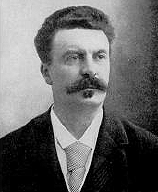August 5: Guy de Maupassant
Guy de Maupassant (1850)
It was on this date, August 5, 1850, that French naturalistic writer Henri René Albert Guy de Maupassant was born, probably in Château de Miromesniel, Dieppe. His maternal grandfather was Gustave Flaubert's godfather, and Guy de Maupassant became friends with Flaubert, as well as with Émile Zola, sharing their religious skepticism.
He studied law in Paris, but at age 20 Maupassant volunteered for the Franco-Prussian War. That experience, as well as Norman peasant life and the fashionable life of Paris, formed the core of his many stories. From 1872 to 1880 Maupassant was a civil servant and joined the literary circle of Gustave Flaubert, through whom he met other leading writers, including Zola, Ivan Turgenev and Henry James. Maupassant adopted Flaubert's ardor for exactness and accuracy of observations, and precision of style. In this, he was aided by a photographic memory.
Between 1880 and 1891 Maupassant wrote about 300 short stories, a literary form that he mastered, some six novels and many poems – totaling about 29 volumes when published 1908-10. His stories include "Boule de suif" ("Ball of Fat," 1880), which made his literary reputation and may have been the inspiration for John Ford's 1945 western, Stagecoach – which in turn made the reputation of a struggling young actor named John Wayne. Another short story, "The Inn," may have inspired Steven King's story, The Shining. His "Clair de Lune," and most of the rest of his literary efforts, express a deep religious skepticism, if not outright Atheism.
In his short story, "The Marquis de Fumerol," for example, a family laments:
If the Marquis de Fumerol, one of the greatest names in France, were to die without the ministrations of religion, it would assuredly be a terrible blow to the nobility in general, and to the Count de Tourneville in particular, and the freethinkers would be triumphant. The liberal newspapers would sing songs of victory for six months...
When the dying Marquis is cornered, a priest confronts him, and the Marquis,
pointed to the door with a proud, tragic gesture, and said angrily and breathing hard: 'Leave this room – go out – robber of souls. Go out from here, you violator of consciences. Go out from here, you pick-lock of dying men's doors!'
But the Marquis shortly dies and the priest administers last rites to his corpse – in spite of which, the family convinces itself that Fumerol somehow expresses gratitude. At the funeral, Viscount Roget "showed in admirable terms that God always returns victorious into well-born souls which have temporarily been led into error... ."
But the deluded Viscount has to stop speaking because his audience is laughing! Speaking for all, someone pipes up, "Bah! That is the story of all conversions in extremis."*
The brilliant decade of the 1880s brought Maupassant monetary reward and literary recognition, which combined with his financial acumen made him a wealthy man – though he also spent lavishly. The strain of overwork and a syphilitic infection he contracted in his 20s, combined with a luxurious lifestyle to ruin his health, both mentally and physically. Maupassant's mind began to fail in 1891 and, after a suicide attempt, he spent the last eighteen months of his life in an asylum in Paris. He died there on 6 July 1893 at the age of 43. Guy de Maupassant once said, "Patriotism is a kind of religion; it is the egg from which wars are hatched."
* Translated by McMaster, Henderson, Quesada, et al.
Originally published August 2003 by Ronald Bruce Meyer.


